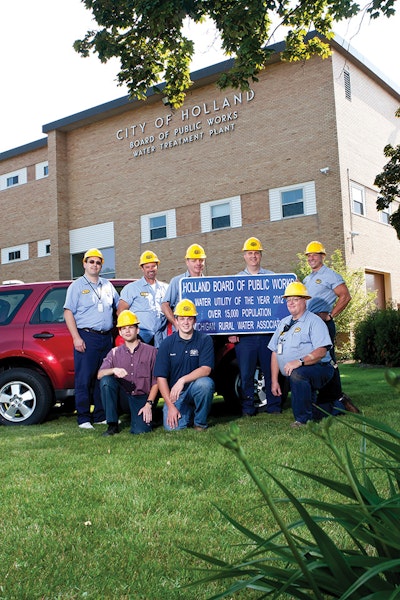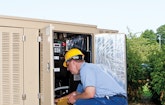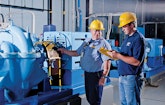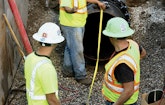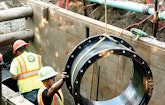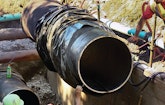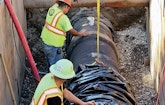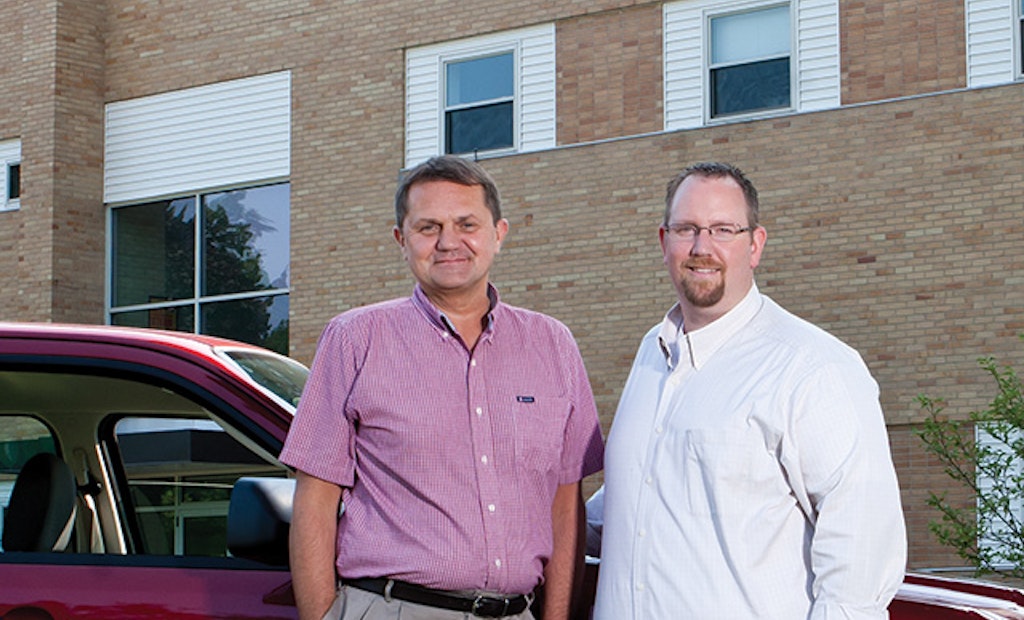
Interested in Rehab/Relining?
Get Rehab/Relining articles, news and videos right in your inbox! Sign up now.
Rehab/Relining + Get AlertsThe City of Holland, Mich., hasn't had any water crises over the years, but that hasn't kept it from making important investments to improve its system and guard against disaster.
Holland is deep into a cooperative project connecting its water system with that of a next-door community as a way to cope with possible future emergencies. It has repair and replacement projects worth millions of dollars lined up for the coming years.
A focus on reliability, aggressive maintenance, innovation and strong employee relations all have contributed to the system's success, says Dan Sorek, superintendent of water/wastewater services for the Holland Board of Public Works.
"We have a long history of high quality and high standards," he says. "We have a very low rate of unaccounted-for water loss — about 2 percent — and we want to keep it that way. We want to stay ahead of the curve. We want to be proactive as opposed to reactive."
That's paid off, in rates competitive even with much newer systems, and also in bragging rights. Earlier in 2012, the city's progressive approach helped it earn Water Utility of the Year honors from the Michigan Rural Water Association.
City-owned Utility
The Holland Board of Public Works is a not-for-profit, city-owned utility chartered 130 years ago. In addition to water service, the utility also provides sewer collection and treatment and electric power generation and distribution.
Located about 30 miles southwest of Grand Rapids and just east of the Lake Michigan shoreline along Lake Macatawa, Holland was founded only 10 years after Michigan was admitted to the union and is now a thriving city.
While the city itself has a population of about 35,000, the BPW serves more than 50,000 water customers in the area, including the entire nearby city of Zeeland (pop. 5,400), which buys Holland water wholesale, and portions of four surrounding townships. Under contracts with those communities, the townships install their own water distribution systems; Holland then conducts routine maintenance and metering of the lines where it distributes water, Sorek explains.
Holland industries include furniture makers, food manufacturers and automobile parts suppliers, among them makers of advanced battery technologies to be used in electric and hybrid vehicles. "There's a lot of entrepreneurial spirit here," says Sorek. And all that industry adds to the demand for water.
Although the area relied mostly on groundwater until the early 1950s and then blended that with Lake Michigan water into the 1970s, Sorek says, Holland has taken all of its water from the lake for more than 35 years.
Strong Record
To date, the community has never seen its water supply threatened, Sorek says. A 2003 Source Water Assessment Report for the city by the U.S. Geological Survey noted that while area land use and potential contaminant sources in the region gave the city's source water "moderately high susceptibility" to problems, the Holland BPW water treatment plant has a record of effective water treatment.
But Holland's leaders don't believe in resting on their laurels. In 2010, the city adopted a Surface Water Intake Protection Program (SWIPP) — an acronym that Sorek and his colleagues pronounce "Swippee."
Communities can put together SWIPPs under a voluntary program through the Michigan Department of Environmental Quality. A SWIPP must define the roles and duties of government units and water suppliers; delineate a source water protection area for the community's water supply source; identify potential contaminant sources in the protection area; outline educational, regulatory and other management approaches to protect the source water; create contingency plans for public water supply sources, including alternate sources of drinking water; ensure that new water sources will be sited so as to minimize potential contamination; and encourage public participation in water protection efforts.
Holland's SWIPP fills 90 pages, not including references and appendices, and was the reason the community was recognized as Water Utility of the Year by the Michigan RWA, which advised city officials during the document's drafting. Among the alternative water sources included in the SWIPP document is a plan to exchange water with the adjacent city of Wyoming, Mich., a 70,000-population community with a water system that serves more than 200,000 in its own surrounding communities.
Interconnect Pipeline
To that end, Holland and Wyoming are constructing a 4.5-mile, 30-inch interconnect pipeline linking the water systems of the two communities. The pipeline was approved for a low-interest loan under the state's Drinking Water Revolving Funds program.
Often, the loan program favors communities where there's been an urgent water quality problem. Applications for the loans are qualified under a point system that awards more points based on the severity and urgency of the proposed repairs.
Holland's record of good performance meant that the community was actually at a disadvantage under that point system in seeking the revolving funds loan, Sorek says. But the loan application got a big enough boost to qualify because Holland had created its SWIPP, and because of the total population served by the two water systems — well over 250,000. The project is seen as likely to significantly enhance the reliability of both systems, Sorek says. "It also expands the water distribution system to an area that is not currently served by public water."
Holland and Wyoming already had smaller interconnects in place. They began exploring a much larger interconnect a decade ago to allow the two communities to be able to reliably turn to each other in an emergency, or even to help foster a possible regional water system sometime in the future. Now it's under construction and could do just that, Sorek says.
Not only has the $6 million project qualified for the low-interest state loan, but because of the American Recovery and Reinvestment Act, 15 percent of the loan principal will be forgiven, cutting the cost to 85 cents on the dollar. "That helped us out tremendously," Sorek says.
Replacement Plans
Repairing or replacing about 15 miles of distribution lines over the next several years is also on the utility's agenda.
Mains will be targeted for work based on how severely they leak. Holland generally prefers polywrapped ductile iron for new pipes, although they sometimes use PVC pipe instead. In most instances, Sorek says, the city has found that all-out replacement will be more cost-effective than alternatives such as CIPP lining.
One reason may be that whenever possible, the city replaces or repairs its mains when streets are being repaired or replaced, which reduces repeated disruptions. "We want to make sure that the customer is only affected once," Sorek says. Sewer work is likely to be undertaken on those areas at the same time.
"Where the street is being resurfaced or replaced, we try to take a holistic approach with the utilities underneath and replace those as necessary as well," he continues. "By partnering with the road agencies, it affords them and us the opportunity to save on restoration costs. Instead of the road agency picking up the whole bill on the restoration, or the utility picking up the whole bill, the restoration cost can be shared between the two agencies."
In 2010 alone, the city replaced 11,785 feet of water mains, according to the Holland BPW annual report.
Water treatment plant capital improvements are also on the horizon: replacing pumps, motors, chemical feed and storage equipment, an upgrade in computer control systems, a rebuild of filter piping structures, new valves, flow transmitters and flow measuring devices, and new electrical actuators are all part of those plans, says James Van De Wege, superintendent of the Holland water treatment plant. The cost is to be spread over the decade so as to avoid a huge hit to budgets at any one time.
Among the technological advances Holland hopes to take advantage of are new, higher-efficiency motors and improved chemicals that can reduce chemical costs and sludge production by as much as 30 percent. New turbidity meters that don't require frequent recalibration are also on the shopping list.
Innovation Meets Cooperation
Meanwhile, the SWIPP is about a lot more than just helping Holland score well enough to get a low-interest building loan, Sorek and Van De Wege say. It's about much, much more.
"We're eager to see the SWIPP get going a little bit more, because it touches on educating the public, and it touches on partnering with other agencies that we have historically not partnered with," Sorek says.
The SWIPP, he continues, "is not a document that we produced just to get points to build a project. It is living and breathing, not just to be placed on the shelf. It is to be looked at, revised and kept up to date; it wasn't just a checklist that we got done."
With Lake Michigan so close at hand, offering a major source of water for a variety of uses, it's easy to become complacent, Sorek says. Holland officials guard against that.
"We were one of the first utilities to put in infrastructure for a water re-use system in Michigan," he says. That project enabled the safe re-use of water from the wastewater treatment plant, rather than simply returning it to the lake.
Such innovation is par for the course in Holland's water operations, along with strong labor-management relations with unionized employees and high-quality service.
"We have a very good working relationship with the employees," Sorek says. "We've been very careful in our selection. We have high standards. That permeates throughout both our management team and our employees, and it shows up in our customer service and in our product."
